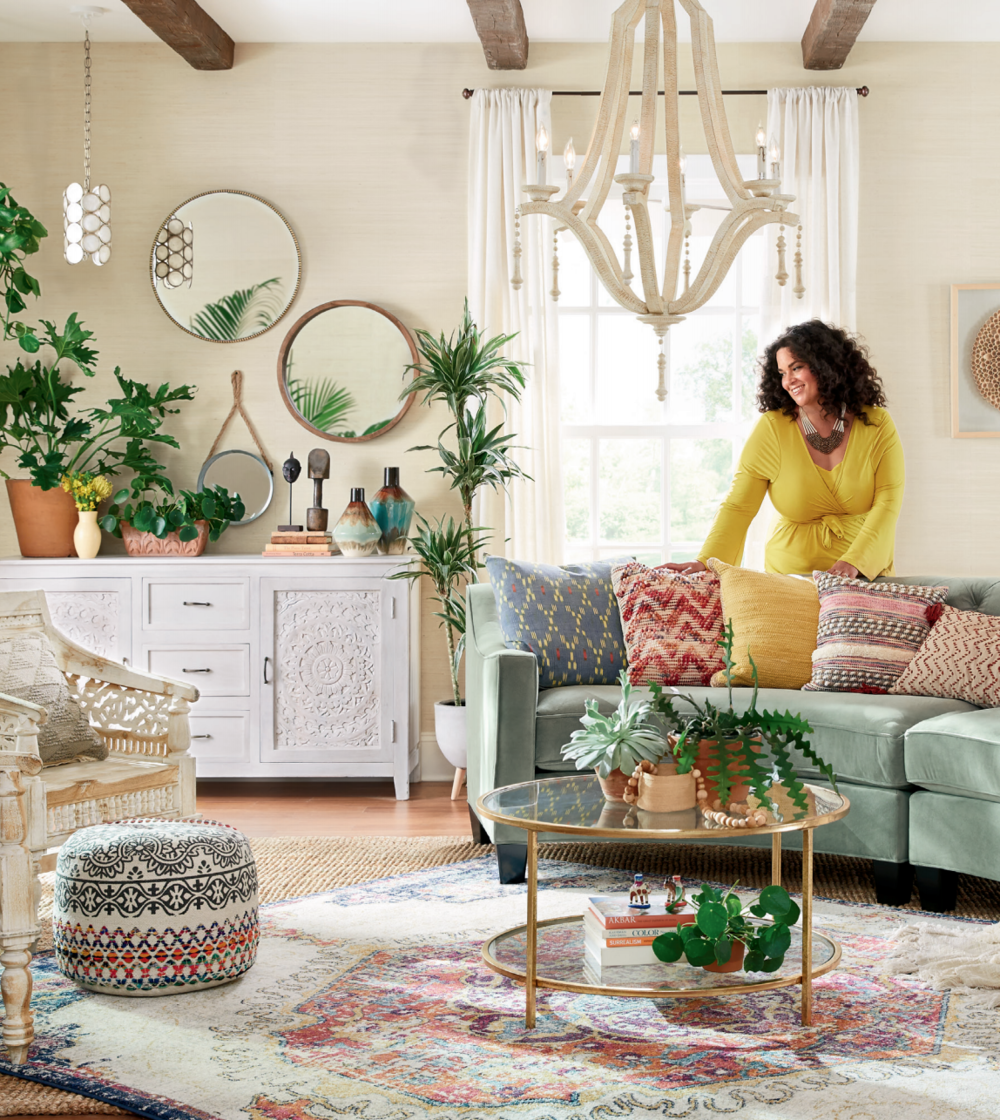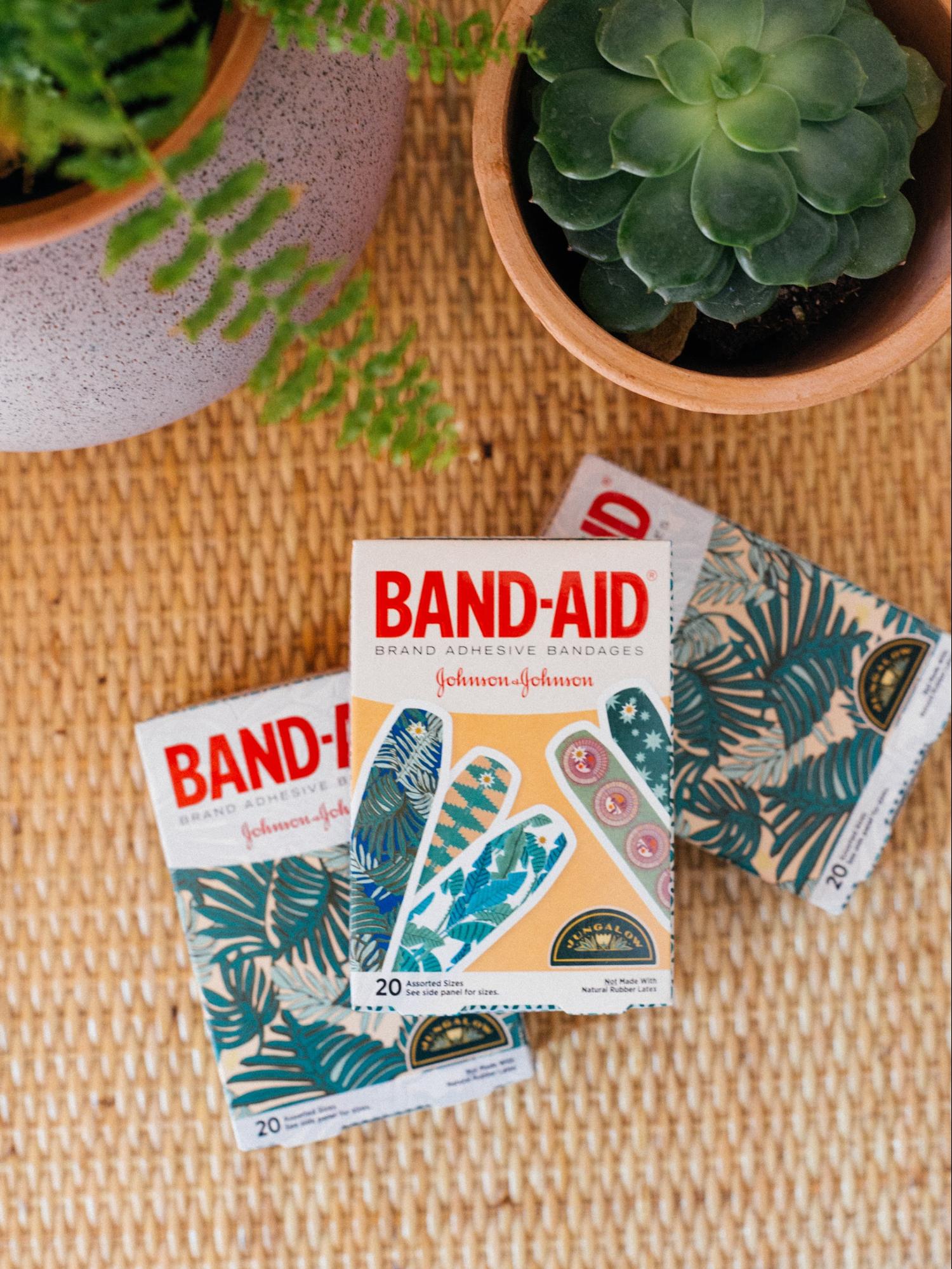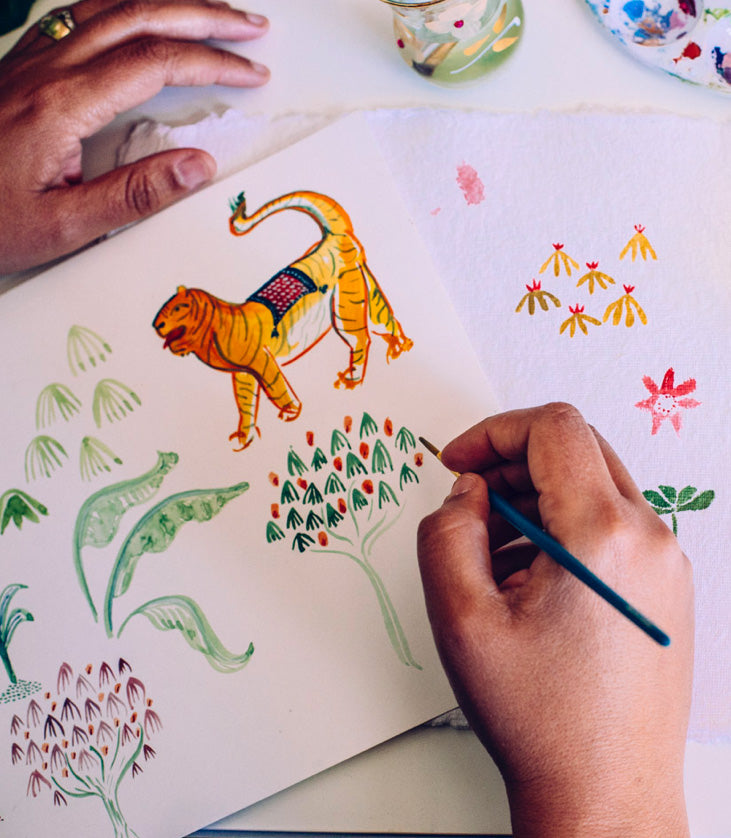This post was written by Jason Buckland and Satta Sarmah-Hightower.
The New Bohemians, the interior design bible that celebrated the remodeling of 20 American homes into their new boho aesthetic, became a surpriseNew York Timesbestseller in 2015. Five years later, even its author has trouble grasping its success. “I still can’t get over that,” she says.
There are other things in her life that Justina Blakeney might also shake her head at. The designer and artist, 41, has scraped together her own small empire by sheer force of personality. With 430,000 followers on Instagram and another 1.4 million forJungalow, her home decor brand found in stores from Anthropologie to Target, Blakeney has come to be known as one of the most unique voices in her space.
From her home in southern California, Blakeney discusses living and working in Los Angeles during a time of great civic importance, pausing and redefining what a successful retail strategy will look like for Jungalow in the wake of COVID-19, and why now, more than ever, brands ought to be putting their money where their mouths are.
“My own personal policy with Jungalow is that I will never speak out about a social cause or about something that I believe in or support without actually following that up with a financial donation,” she says. “It rubs me the wrong way when I feel like companies are just saying something to avoid being called out.”
(This interview has been edited and condensed for clarity.)
Your home is Los Angeles, which of course played a central role in one of thewatershed moments in the 1990sregarding race relations in America, and has also been a central place for Black Lives Matter demonstrations this past month. What is it like to live and work in L.A. right now?
Blakeney:I feel like I could be anywhere in the country right now, because I haven't left my house in three or four months. It was tough for me when all the big protests were going on to not rally and go out there with my husband and daughter because we're very much that family. But we have people who are in our [COVID-19] bubble—people who we see regularly, who are at very high risk for COVID—and so we had to make the decision to support the movement in other ways.
But having been to many different protests, whether it was during the Occupy Movement or during the Women's March and lots of different initiatives here in L.A., Los Angeles is such a powerful and incredible place for this type of thing because there is so much creativity here. The way that people support the movement and the way that people express themselves is so smart, fun, memorable, colorful, viral, and‘Gramable, which is really important these days to help proliferate the message.
But I've been feeling really blessed that with both my business and my social media following, I'm able to support the movement in other ways and feel like I'm part of it while I'm still practicing social distancing and making sure I don't expose any of my loved ones to COVID.
There have been a lot of calls to support Black-owned businesses, with initiatives like the15 Percent Pledge. What is the role and responsibility that brands have right now, and what role can they play in ensuring their actions are more than a moment and part of a movement?
Blakeney:We do a lot of different initiatives at Jungalow, whether it’s to support women and children at the border, the Black Lives Matter movement, or environmental initiatives.
One thing that I've realized coming up through the channels that I've come up through—with social media being the main way I've grown my business—is that when emotions are running high and people are feeling a way about something, it's a really powerful time to be able to harness that emotion and turn it into doing good.
With the Women’s March, I decided to take one of my paintings and sell it online, with 100% of the proceeds going to a local shelter here in L.A. In two days, we raised $15,000. From that moment on, it was just a really exciting thing for me because I realized I could make change through art, raise funds through art, and support causes that I believe in through art.
Now, with the Black Lives Matter movement, as soon as I felt that same stir, I was like, "Okay, great, we can raise money.” So, we've done a few different initiatives. We did the one day of proceeds andraised about $12,000, which we donated to Black Lives Matter. After that, Isold 9 original paintingsand we donated the proceeds to theBlack Visions Collective. For that one, we raised $4,500 in less than an hour. I don't sell my original pieces very frequently. I like to save them for moments like this, where emotions are running high and everyone wants a vehicle for how they can help. Providing that is a very powerful tool.
Justina, you’re the face of your brand. In a time like this, where the overwhelming sentiment is that silence is complicity, what public role do you think people who are the faces or voices of their companies should be taking right now?
Blakeney:这是非常重要的,我们认为人accountable for their actions and that we understand that behind every company is either a person or multiple people who are making the decisions about what that company says or does. It's extremely important to have an opinion and be public about it.
I've definitely stopped shopping at certain businesses over the past month or so—businesses that I haven’t liked the reaction I've seen about the movement. People who are shying away from saying things like “Black lives matter.” I don’t understand it and I don’t support it.
It's very important for people to speak out. My own personal policy with Jungalow is that I will never speak out about a social cause or about something that I believe in or support without actually following that up with a financial donation. It rubs me the wrong way when I feel like companies are just saying something to avoid being called out, or that they’re tokenizing.
However, now that this is something that’s so in the public sphere, we do have to give companies a chance to take a look at themselves and make some changes. This isn't something that's going to happen overnight.
You have used social media the last month to great effect, both personally and through the account of Jungalow. What considerations do you make in a time like this about public communication, in the sense of: How do you decide what public statements should come from you personally, or what should come from the brand itself?
Blakeney:对我来说,这是一种本能,我没有specific science around that. We usually take the “we” voice with Jungalow, and I break that sometimes. I break it when I have something that I want to share that's clearly coming from me [that], for whatever reason, the Jungalow audience will get or love or share. So really it's about what I'm hoping my audience gets out of what I'm sharing.
I will say that since June, it's just been me posting [on the Jungalow account], and we've curbed the amount of posting that we're doing and we stopped doing more consumer-y posts for the first three weeks or so of June.
We've just started doing it again, but it's a tone thing. Read the room, and be able to take the temperature of your audience. I'm not an expert in this. I'm just following my gut and sometimes it turns out okay.
You posted recently about looking back to your mother and father—who came of age in Berkeley, which was such a politically active and important city during the 1960s—reflecting on how much power they then had to change the system. What conversations have you had with your parents about what's going on today with race relations in America?
Blakeney:Me, my parents, my brother, and sister all had a three-hour long talk on Zoom a few weekends back, just talking about what was happening and all of our feelings around it. I really got a chance to talk to them about some of the differences between what it felt like back then and what it feels like now.
My parents both have a very different view on everything that’s going on. My dad, who is African American, was very optimistic and was feeling like, “This feels very different from anything that I've experienced in my lifetime.” In both the movement that's happening with Black Lives Matter, but also the greater context of COVID, and how different the world feels and looks right now. It's a little bit hard to separate the two things, at least for my dad, maybe because in many ways he feels that this movement is in reaction in great part to COVID because all of a sudden everyone's in the same boat.
我妈妈是一个巨大的人格在民权米ovement and taught African American studies in the 1960s at Sonoma State University, when those curricula were just getting off the ground. She is Jewish American, but has always had that racial justice, social justice, fire in her. She's feeling very cynical—not about the movement, in particular, but that it's more than a moment. She's feeling less optimistic that this is going to be something that can effectuate lasting change.
They just have different viewpoints on it. We're all reading this differently and we're all feeling it.
In a 2013blog post, you said you preferred the word “eclectic” rather than “ethnic” to describe your style. Has the design industry gotten better in recent years about getting that nomenclature right?
Blakeney:No, not really. Fashion is a big culprit of this, as well. It's funny because one of the things that was the impetus for that blog post was that a photographer and stylist were shooting my home for a magazine spread. I had my hair out and I was wearing a Guatemalan dress, and the stylist and the photographer were whispering to each other. But they were close to me. I heard them say, "Do you think she looks too ethnic?” That's the kind of thing I experience a lot, and it can be extrapolated from a person to a thing. What I really don't like about the word ethnic is that it's an “othering” bucket.

What does ethnic actually mean? Does it mean just not white? I don't get it. So it’s like the ethnic grocery store; I don't understand what that means at all. Does that mean Swedish food? Is it African? Is it Asian? I just want to know. So I don't like that term for that reason. I think it's a lazy term. They're like, "Oh, this is different. It's ethnic." It’s used a whole lot in the design industry. It's used a lot in fashion. It's used a lot and a little bit everywhere.
But also, the distinction in how a word like that is used in design is tricky. Because you might have a room, and in that room you might have African baskets on the wall from Burundi. And then let's say you've got a Suzani on your bed, and that's a quilt from Uzbekistan. And then let's say you've got a Otomi runner over your dining table, and it's made by weavers in Mexico. So you're looking at the whole house and you're like, "Oh, it's ethnic," or even global. But what that does is it erases the cultures that have brought these things to us and the deep traditions and histories from people all over the world. It just puts them in this “other” bucket, which is quite disrespectful.
Let's shift to a few things more related to your career. You'vesaidthat you were once deterred in some ways from entrepreneurship, because math was something that was difficult for you, and you never went to business school. But somewhere along the way, you realized three things were most important to becoming a good entrepreneur: creativity, confidence, and persistence. How did you come to believe that?
Blakeney:Because I’m making money! (Laughs) I look at what I've been able to build over the past 10 years and what skills I attribute to my success. I’m a confident person. I believe in myself. I have dreams and goals, and I'm able to achieve them. With each small success, it fuels me to drive ahead to reach more goals and different levels of success. I've seen it time and time again that confidence is huge. It's a very underestimated thing that people should try to build more of.
Creativity is also something. I've always gravitated towards making things, bringing things into the world. It lights me up, that experience of being able to start with nothing and turn it into something—whether it's just a blank sheet of paper that [becomes] a painting that gets sold.
You also have to take risks in business. You need to have the confidence to take risks and you have to have that resilience. Because when you take risks, things don't always pan out how you want or expect. Being able to make lemonade out of lemons. Trying things out and not getting deterred if you don't meet your goals or it doesn't look how you expected it to look. I think that's all really important.

You've done several collaborations with other brands, including Granada Tile, Fabricut, and even Band-Aid. What did you learn from these, and what impact have they had on your brand?
Blakeney:I love collaborating, and I’ve actually been doing these types of collaborations for much longer than our online shop has been open. It was really the collaborations that drove the need and desire for me to open the shop.
I evaluate a lot of different things when deciding who to partner with for different projects. And one thing is: Are they producing something I can't produce myself? Or are they doing it in a way that I wouldn't be able to do myself?
The second thing is: Is this going to help get the Jungalow name out there and get exposure to people that we might not otherwise be exposed to? That’s obviously a great way to help with brand recognition and just get our vibe out into the world. With the Band-Aid collab specifically, the idea of having little pieces of my art healing cuts and bruises all over the world—that was a really fun idea.
As somebody who believes that art and color and living in a beautiful environment really can change the quality of life and help people and move people, what I look for is: How can we proliferate that message more?
You've publiclymentionedyour desire to open your own store one day. What considerations are involved with the journey of taking a brand that sells well online—and even sells well through wholesale at major stores like Target (pictured above) and Anthropologie—to doubling down and opening your own retail shop?
Blakeney:That dream is on pause. I've always wanted to have a brick-and-mortar [store] for Jungalow because it is a lived experience. It's something that I want people to be able to be awed by, excited by, and be inspired by in real life.
I've also been very clear for the past couple years that I wasn't going to do a brick-and-mortar [store] unless I own the building. Part of that is because I live in L.A., where the rents are absolutely astronomical and the buildings hold value. I'm actually feeling so grateful right now. I'm so grateful now because in my neighborhood, where we've always wanted to open the store, so many businesses are closing permanently because of COVID. Who knows how long this is going to go on for?
Looking forward, the retail landscape is going to be forever and completely changed. So right now I will be thinking about how to create those [in real life] touchpoints for the brand in new and different ways. I think it is going to be more about collabing, orstore-in-store experiences, or completely different experiences—whether it's more of a museum approach, and there are online components or experiential marketing components [to] bridge [the] online and offline world.
It was already time to reevaluate brick-and-mortar retail, but I think right now it's time to reevaluate retail [as a whole] and ways of doing things that have been the same for 100 years.
You oncesaidthat, “Enjoying my life is always a north star for me, [but] whenever I feel like a job isn't fun, I just need to pivot.” There’s no doubt that you’re committed to Jungalow, but you’ve also shown yourself to be very multifaceted in your previous pursuits. What things in business might you like to pursue that you haven't already?
Blakeney:I have so many things I want to do, but there just aren’t enough hours in the day. If I actually told you what my big dreams and goals [are], you would be like, “Okay, calm down, Justina.” But I think that I really do have the power to help change systems and the way we do things. We all have that power, but it's really about how deeply you step into it.
Jungalow is such a big part of my life right now, but I do dream of getting more into different types of media. I've always been an ideas person. I have a journal where I jot down future ideas, and it's just big. A little bit of it is working on these ideas while I'm also working on Jungalow. I've always been the type of person who's planting lots and lots of different seeds. Then, as different things start to sprout, I start to pay a little more attention and see where those things take me.
You've recently turned 41. In business, what are you the most proud of so far?
Blakeney:I'm proud of all of it. I've always worked hard. I've always had big dreams, but I just never expected any of this to happen. I'm super proud of the team I've built. We're all tight and we're all friends. It’s a great vibe and a great community.
我很感激和自豪的观众我cultivated. We have more than two million fans online, who we get DMs and emails from on a daily basis about how we've helped them transform their homes into a place they're excited to come home to after work each day. Those things really light me up.
Mybookwas aNew York Timesbestseller—I still can't get over that. It's so hard for me to choose. I feel like, along with being a hard worker and winning the lottery in the parent department, I’ve also just had a tremendous amount of luck. I’ve been really, really blessed to be raised in this time with these opportunities that I've been able to grab a hold of and run with.

What is the most pressing thing in your mind that you have left to achieve?
Blakeney:I am trying to get to a place where I don't have to worry about money, so that when I'm at that place I feel like I could pursue with confidence and with leisure the types of things that I'm really excited about pursuing. Whether that's helping young people with their businesses, or painting all day, or whatever the thing is that I feel like I want to be doing. I'm not at a place right now where I don't have to worry about money.
For me, that’s having enough money in the bank where I feel, like, chill. Then at that point, I can really geek out and be super creative and not have to stress about that. So that's probably the most pressing thing, and I'm getting there. With the growth that we've seen of the shop in this last year, probably in about two to three years I'll be at a place where I'm not stressed. But right now, I'm not quite there yet.
It's always been important to feel great about what I'm building, knowing that the money will come. It's just taken a minute, but that's okay.
Read More
- 耶鲁大学经济学家k Sudhir的未来Work, and How Retailers Survive a Recession
- Uri Minkoff on Tariffs, Who Does Retail Right, and the Democratization of Fashion
- Emma Grede on Sizeism, the Kardashians, and Why Some Retailers Still Won’t Stock Good American
- Ross Bailey on Moving IRL Online, and What Retail’s Comeback Will Look Like
- Daymond John on Bombas, TikTok, and the ‘Shark Tank’ Deal That Got Away
- Tamara Mellon On the New Luxury, and Why the Days of Brands Staying Neutral Are Over
- Hugo Engel on Leon’s COVID-19 Pivot with Feed Britain and How Restaurants Can Embrace Technology






